Where Is It Located Review Tab in Word 2016
Lesson 1: Getting Started with Word
Introduction
Microsoft Word 2016 is a word processing awarding that allows you to create a variety of documents, including letters, resumes, and more. In this lesson, y'all'll larn how to navigate the Word interface and become familiar with some of its about important features, such every bit the Ribbon, Quick Access Toolbar, and Backstage view.
Watch the video below to become more familiar with Word 2016.
Getting to know Give-and-take 2016
Give-and-take 2016 is like to Word 2013 and Word 2010. If yous've previously used either version, and so Give-and-take 2016 should feel familiar. But if yous are new to Word or have more feel with older versions, you should outset have some fourth dimension to become familiar with the Word 2016 interface.
The Word interface
When you open Word for the first time, the Start Screen will announced. From here, yous'll be able to create a new document, choose a template, and access your recently edited documents. From the Start Screen, locate and select Bare document to access the Give-and-take interface.
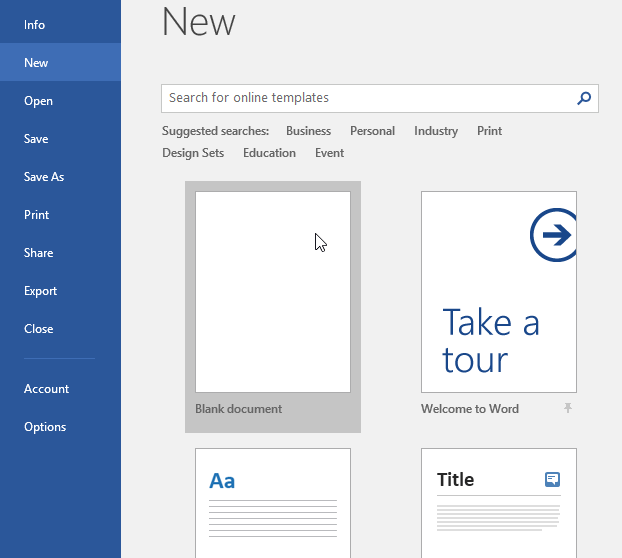
Click the buttons in the interactive below to acquire more about the Give-and-take interface:
Working with the Word surround
Like other recent versions, Word 2016 continues to employ features similar the Ribbon and the Quick Access Toolbar—where you lot will find commands to perform mutual tasks in Word—as well as Backstage view.
The Ribbon
Word uses a tabbed Ribbon system instead of traditional menus. The Ribbon contains multiple tabs, which you can find most the top of the Word window.

Each tab contains several groups of related commands. For instance, the Font grouping on the Home tab contains commands for formatting text in your document.

Some groups also accept a small arrow in the bottom-right corner that you tin can click for even more options.
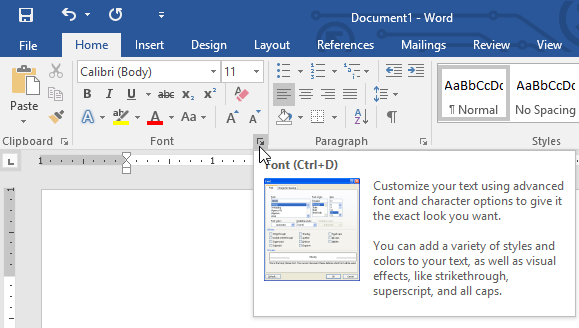
Showing and hiding the Ribbon
If you discover that the Ribbon takes up also much screen space, you can hide it. To do this, click the Ribbon Display Options arrow in the upper-right corner of the Ribbon, then select the desired choice from the drop-down menu:
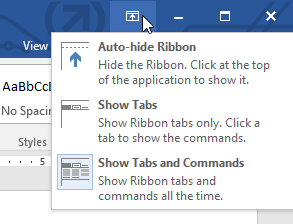
- Motorcar-hide Ribbon: Auto-hide displays your document in full-screen mode and completely hides the Ribbon from view. To show the Ribbon, click the Expand Ribbon command at the top of screen.
- Show Tabs: This option hides all command groups when they're not in use, but tabs will remain visible. To show the Ribbon, simply click a tab.
- Evidence Tabs and Commands: This option maximizes the Ribbon. All of the tabs and commands will be visible. This option is selected by default when you open Word for the first time.
To learn how to add custom tabs and commands to the Ribbon, review our Extra on Customizing the Ribbon.
Using the Tell me feature
If you're having trouble finding command you desire, the Tell Me characteristic can assist. It works merely like a regular search bar: Type what you're looking for, and a listing of options will appear. You can so use the command directly from the carte du jour without having to find it on the Ribbon.
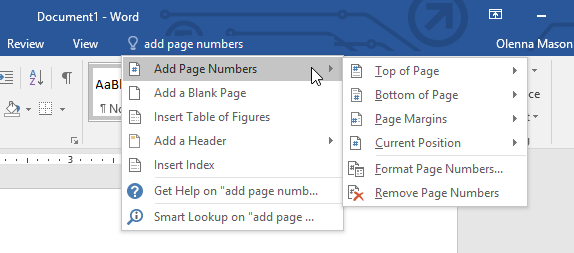
The Quick Admission Toolbar
Located just above the Ribbon, the Quick Access Toolbar lets you access common commands no matter which tab is selected. Past default, it shows the Save, Undo, and Redo commands, but you can add other commands depending on your needs.
To add commands to the Quick Admission Toolbar:
- Click the drop-down arrow to the right of the Quick Access Toolbar.
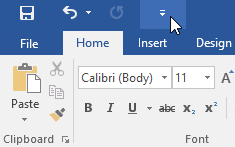
- Select the command you want to add from the menu.
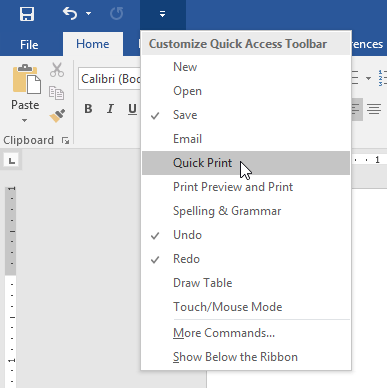
- The control will exist added to the Quick Access Toolbar.
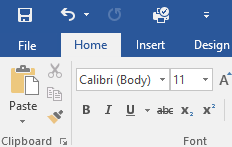
The Ruler
The R uler is located at the top and to the left of your document. It makes it easier to adjust your document with precision. If you want, yous can hide the Ruler to create more than screen space.
To show or hide the Ruler:
- Click the View tab.

- Click the checkbox next to Ruler to evidence or hide the Ruler.

Backstage view
Backstage view gives you diverse options for saving, opening a file, printing, and sharing your certificate. To admission Backstage view, click the File tab on the Ribbon.
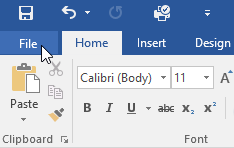
Click the buttons in the interactive beneath to learn more than most using Backstage view.
Document views and zooming
Word has a variety of viewing options that change how your document is displayed. You tin choose to view your certificate in Read Mode, Print Layout, or Web Layout. These views can be useful for various tasks, peculiarly if you're planning to impress the document. You lot can also zoom in and out to brand your document easier to read.
Switching document views
Switching betwixt different document views is piece of cake. Just locate and select the desired document view command in the bottom-right corner of the Word window.
- Read Way: This view opens the document to a total screen. This view is great for reading big amounts of text or merely reviewing your work.
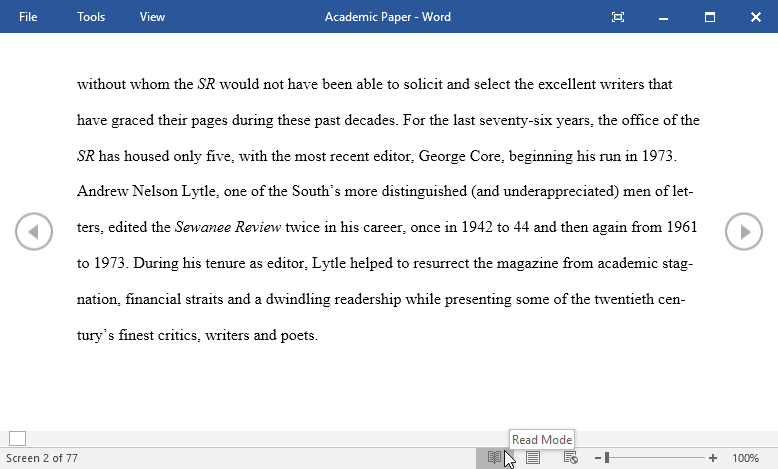
- Print Layout: This is the default document view in Word. Information technology shows what the certificate will look like on the printed page.
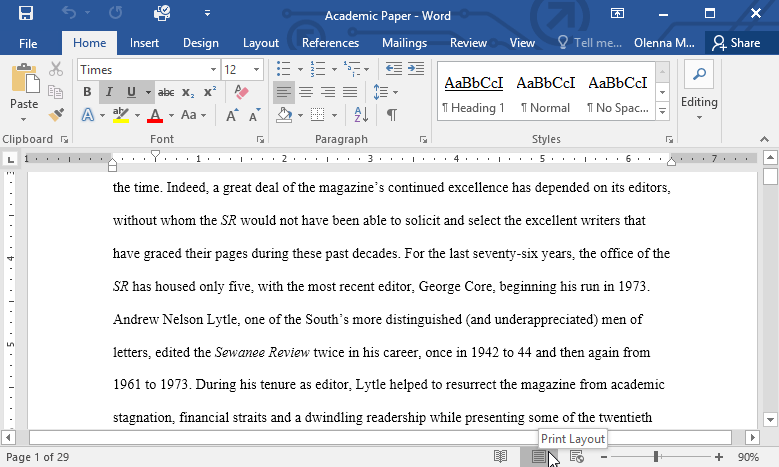
- Spider web Layout: This view displays the document as a webpage, which can be helpful if you're using Word to publish content online.
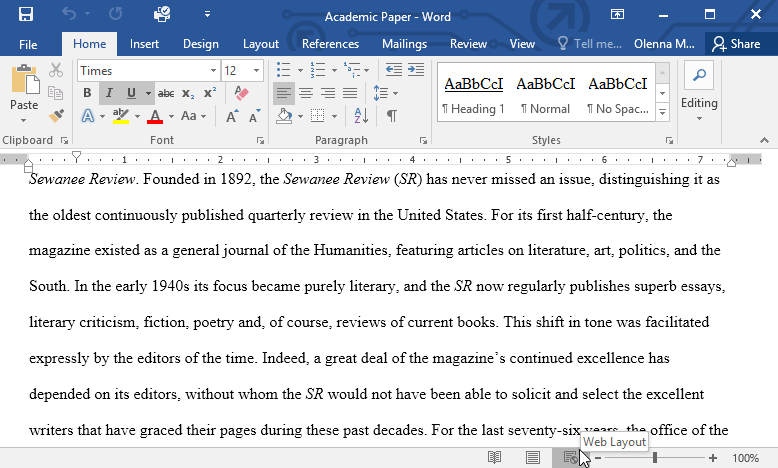
Zooming in and out
To zoom in or out, click and drag the zoom command slider in the lesser-right corner of the Word window. You tin can too select the + or - commands to zoom in or out by smaller increments. The number adjacent to the slider displays the current zoom per centum, also chosen the zoom level.

Claiming!
- Open Word 2016, and create a blank document.
- Change the Ribbon Display Options to Prove Tabs.
- Using Customize Quick Admission Toolbar, add New, Quick Print, and Spelling & Grammar.
- In the Tell me bar, type Shape and printing Enter.
- Cull a shape from the bill of fare, and double-click somewhere on your document.
- Show the Ruler if it is non already visible.
- Zoom the document to 120%.
- Change the Certificate view to Web Layout.
- When yous're finished, your certificate should look something similar this:
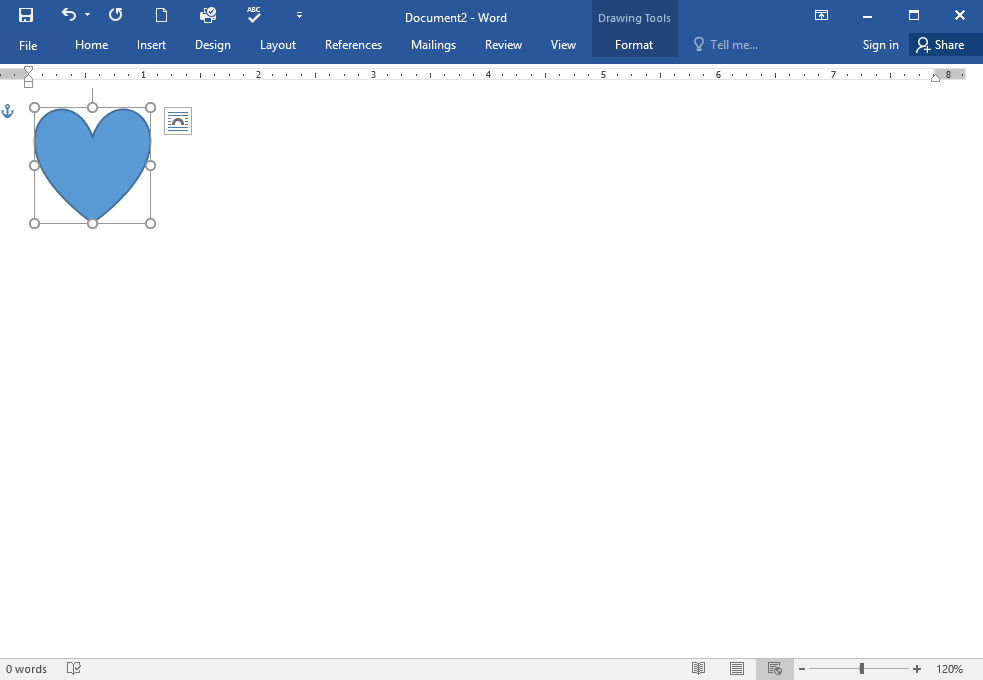
-
Modify the Ribbon Display Options dorsum to Evidence Tabs and Commands, and change the Document View dorsum to Print Layout.
/en/word2016/understanding-onedrive/content/
Source: https://edu.gcfglobal.org/en/word2016/getting-started-with-word/1/